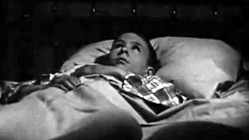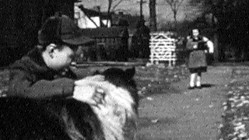|
When
young Billy doesn't want to go to sleep,
is it because he's simply not tired, or is
there another, more sinister reason for
not wanting to go to bed? (And
is that a Calcinator death-ray you're
constructing with your erector-set there,
young man?) Despite
all protests Mom puts Billy to bed, turns
out the lights, and closes the door,
leaving our boy alone in the darkened
bedroom. And as the shadows start to
resemble dark and evil things, Billy's
imagination quickly gets the better of him
as those shadowy phantasms solidify and
begin to creep closer to the bed...

Before
the advent of the VCR, when a teacher
wanted to show their class a film,
students had to be herded into a film
room, where a large screen and a film
projector awaited. That's
the way it was for me, anyways, back at
old Holstein Public. On film day, we were
marched into the auditorium, single file,
and as we took our seats in the uniform
rows of hard plastic chairs, Mrs. Whoever
fired up the old projector -- the brittle
film popping from the heat of the
projector light as the synch-sound warbled
and hissed over the mono-speaker -- and
then the scratchy feature spooled up with
the prerequisite countdown, that beeped
and blooped along as we all gleefully
counted off the giant, upside down numbers
until the film proper began.
And
on one particular day, we watched a film
concerned with the Parkers: a happy
family of four; Dad, Mom, Johnny and young
Sally (-- or something like that).
The Parkers were a happy clan, and
apparently had a good life ... Dad made
the money, Mom kept the house, and Johnny
and Sally did what kids do (--
whatever that may be). Watching
a day in the life of this family, they
lovingly interact, laugh, and play, but
then the narrator turned ominous when
night fell. And after the family tucked
itself in for the night, the narrator says
despite everything we've seen, Dad had
made one fatal mistake: their house wasn't
equipped with smoke detectors. And to
illustrate the gravity of that mistake, as
the family slept peacefully, a fire breaks
out. Luckily, the neighbors saw the flames
and called the fire department.
Why
didn't the Parkers call the fire
department?
BECAUSE
THEY WERE ALL DEAD!!!!
DEAD!
D-E-A-D-Dead.
Accented
by a loud, dissonant stings on the
soundtrack with each grisly discovery, I
recall the camera moved slowly, from room
to room, showing each family member
splayed out, dead, from smoke inhalation
... And
as we all watched horrified, the narrator
pounded it into our impressionable young
skulls that all of this could have been
prevented with a simple smoke detector.
Which is why, after school, a dozen
first-graders -- shell-shocked, and
probably scarred for life, went home to
beg and plead with their own Mom and Dads
to equip their homes with these all
important doohickeys BEFORE IT WAS TOO
LATE!
This
abomination was my introduction to the
world of educational shorts, and I'm
sure we've all got a similar story with a
similar film.
Looking back, I assume that this safety
procedural was probably sponsored or made
by a company that sold smoke detectors.
Over the years since, I've run the full gambit
of these type of educational shorts: from
hygiene to the horrors of drugs, and road
safety to sex education -- you know, the
ones where the girls had to go see a film
in the library, while the boys went and
saw one in the gym. And though the intentions
of the makers of these little morality
plays, no matter the subject, might have
been noble or pragmatic, their execution
usually needled into insidious and even
sadistic as they tried to pound knowledge
into our heads or scare us straight. With
all that in mind, we all should be a
little worried about what's in store for
poor young Billy, lying there, trapped in
the dark.
Regardless
of the ultimate outcome, Billy refuses to
go down without a fight. Springing from
his bed, he calls for his mom, who comes
running, as our friendly narrator
(James
Brill) chimes in and laughs at
young Billy's irrational behavior, but
then reminds us that fear is natural and
nothing to be ashamed of. Once she gets
him calmed down, Billy begs his mother to
leave the lights on, just this once (--
to help keep the spectral narrator at bay),
but Mom backs up the narrator, saying
being scared is nothing to be ashamed of. (Nothing
to be ashamed of, yes, but will get you
laughed at in most circles.) Dear
old Mom then comforts the boy by relating
a near disastrous day in the kitchen,
where a grease-fire almost killed them all
if not for the quick actions of Pop (--
who put down the bourbon long enough to
dowse the flames).
Explaining further, Mom says fear is a
warning sign: it's nature's way of telling
you to avoid danger.
This
leads to another flashback of Billy
playing catch with friends at school, when
he air-mailed a throw that landed on top
of the roof. As the other kids triple-dog
dare him to get it down, Billy is
ultimately too scared to climb up that
high. In that case, Mom says Billy's fear
to avoid unnecessary danger was, in truth,
just good common sense. She's also proud
of him for not caving in to peer pressure
and looking foolish in front of his
friends. And
after two incidents that could have led to
death, disfigurement, or dismemberment end
peacefully, a viewer has to worry if
they're saving something special
for the end.

The
lesson continues when Mom says there's
another kind of fear: being chicken when
there's nothing really to be chicken
about. Asking Billy if he can think of an
example of this, he
relates the tale of Kathy Lewis, who has
an irrational fear of dogs. Apparently, he
was playing with a friendly dog and asked
her to join him, but she panicked and ran
away (--
the sissy!). Mom
then relates another story, about Keith
Hogan, who was scared to swim but there
was nothing to really fear (--
except for a little thing called drowning,
and the possibility of being eaten by
sharks). And then there was the
little matter of Frank Campbell, who hid
out in his basement because his report
card stunk so bad, he was afraid to
confront his parents, fearing they
wouldn't love him anymore since he's not
very bright.
Eventually,
Kathy got over her fear of dogs because
her father bought her a puppy (--
at least he didn't buy her a pitbull),
and Keith eventually learned how to swim (--
after being constantly thrown in the water
and ordered to sink or swim),
and
Frank's parents didn't shun him but worked with him to get his
grades back up. (YOU FORGOT TO CARRY
THE TWO! DO YOU THINK THEY LET YOU USE
REMAINDERS IN THE REAL WORLD, MISTER! WELL
GUESS AGAIN!!!)

To
wrap things up, Mom reminds Billy that the
best way to get over your fears is to talk
about them with someone you trust (--
and not to someone who'll spread it around
and ruin the rest of you're natural life).
When she asks Billy if there is anything
he'd like to talk about, he admits
that it isn't really the dark he's afraid
of but being left alone (-- and
those nights when all those bed-springy
noises come from his parent's bedroom.
What's that all about?). Promised
that his parents would never leave him,
and will always be there when he needs
them (-- great, now he'll never
move out), with
that assurance, Billy climbs back in to
bed. After tucking him in, when Mom offers
to leave the light on, Billy says to just
leave the door open a crack instead. With
that, she shuts the lights off and leaves.
Billy, meanwhile, shuts his eyes and goes
to sleep, dreaming of his Calcinator
death-ray -- and do we hear something wet
and slithery gain footing under the bed.
Was that a tentacle? Sadly, no, but as the
narrator chimes back in and
asks the viewer if Billy will be better
off after his talk with Mom by checking
off five questions for us, the answer to
each is a disappointing probably not.
The
End
Hooray!
Nobody died!
As
we touched on before, these type of
educational shorts were usually pretty
draconian in nature, but this kind of
heavy-handedness typically achieved the
exact opposite reaction the filmmakers had
intended, often resulting in fits of high
hilarity. And throughout
this month of August, we'll be viewing and
poking fun at all kinds of
educational/exploitational shorts. Who
made them. Where they came from. And
why they went so horribly, horribly wrong.
So
sit back, reminisce, and try to find out,
like me, where we went wrong and boggle
why we aren't dead.
Yet.
|